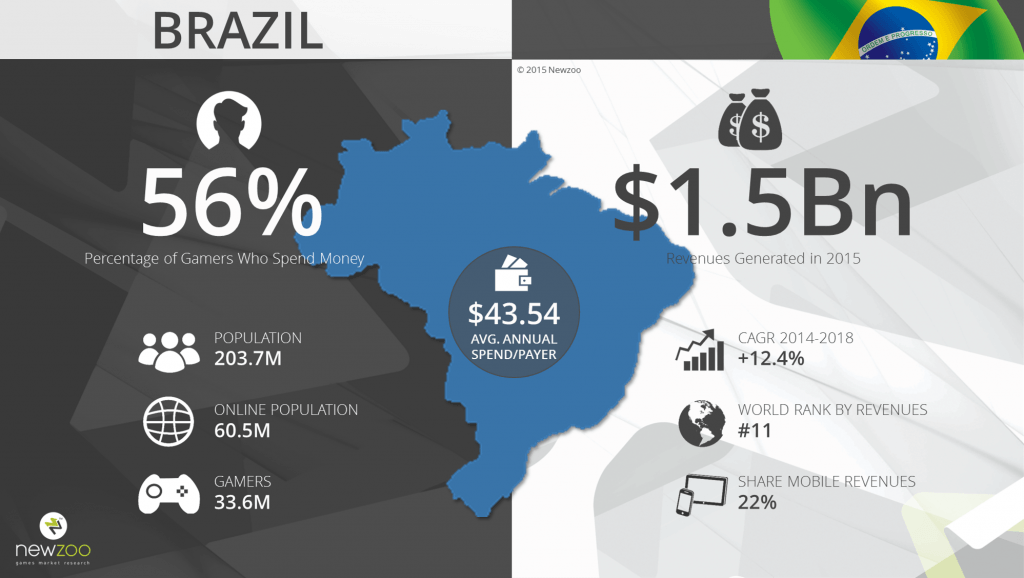RIO DE JANEIRO, BRAZIL – The gaming market in Brazil is expected to grow approximately 5.3 percent by 2022, according to the findings of PricewaterhouseCoopers’ 19th Global Entertainment and Media Survey (PwC).
Last year, the sector’s revenues in the country reached US$1.5 billion, holding the leading position in Latin America and 13th in the global ranking.

According to PwC, mobile games alone will increase revenues from US$324 million in 2017 to US$878 million in 2022. The national digital games market’s expected revenues will reach US$1.756 billion.
The survey analyzed fifteen industry segments in 53 countries and showed that global revenue should reach US$2.4 trillion in 2022 against US$1.9 trillion in 2017. According to PwC, digital advertising and gaming segments will be the fastest-growing by 2022 — the forecast average annual expansion is twelve and fifteen percent, respectively.
According to the research report of the 2nd Brazilian Digital Games Industry Census, financed by a technical cooperation agreement signed between the Ministry of Culture, the Brazilian Cooperation Agency and the United Nations Educational, Scientific and Cultural Organization (UNESCO), 375 developers of digital games were found in Brazil in early last year — a 182 percent expansion over the first census, prepared in 2014.
Of this total, 276 were formal companies, demonstrating a growth of 107 percent in the same period, in addition to 99 informal companies. The survey was released in 2018.
Rio and São Paulo Gaming Development Centers
The report confirms Rio and São Paulo as gaming development centers (42.4 percent of the total), with Brazil’s Southeast region having the largest number of digital gaming companies (52.9 percent).
The study also shows that, when compared to the first census, the number of companies established outside the capital cities increased from 23.3 percent in 2014 to 27.9 percent in 2018. In the state of São Paulo, the growth in the number of formal developers was 82 percent between 2014 and 2018; in Rio de Janeiro, 160 percent; and in Minas Gerais, 316.7 percent, for the same comparison.
According to the Brazilian Association of Digital Games Development Companies (Abragames), Brazil is behind market leaders such as the United States, Japan, Canada, France, and the United Kingdom. “Nevertheless, we are among the emerging industries with the greatest potential,” the organization told Agência Brasil.
Despite the current poor results of the Brazilian economy, the gaming industry is experiencing a historic boom. Data from the Technological Innovation Survey (Pintec), of the Brazilian Institute of Geography and Statistics (IBGE), show that the number of computer program developers in the country grew, on average, 9.07 percent a year between 2007 and 2014.
The growth in the number of Brazilian companies developing digital games in the last four years was around 4.5 times the average growth of software developers, for instance.
A further indicator of this growth is the sheer number of games developed in 2016/2017. According to Abragames, there were 946 produced in 2017, against 754 in 2016 against – a growth of 28 percent. Considering only entertainment games (excluding both structured and educational games), the yearly growth was fifty percent.

